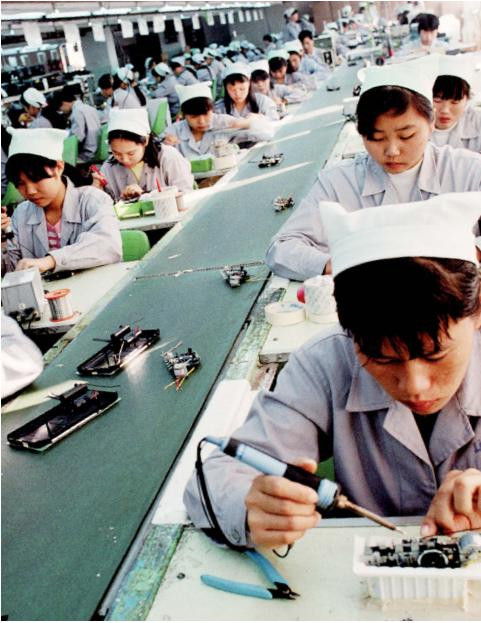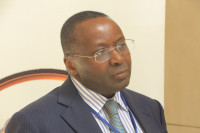Economics & Global Development
Climate Change
Geopolitics & Global Security
Trade, Consumption & Global Markets
Greenhouse Gases Emissions
Climate Adaptation & Resilience
Political Economy & Governance
Post-Doctoral Fellowships
United Kingdom
2009.06.30
A geospatial analysis of the environmental impacts of the UK consumption: analysing the triangular trade between UK, China and Africa
Dabo Guan is studying one of such patterns, between UK, China and Africa. This is no coincidence that China is both the most important CO2 emitter in the atmosphere and the largest global manufacturing hub, connecting resource providers from Africa to OECD countries with their enormous needs of consumption. If many developed countries are already trying to reduce their carbon footprint, some developing countries are more reluctant to take new actions as their production destined to satisfy the huge needs of developed countries is the driving force of their economies.
According to Dabo Guan, national efforts are only part of the story. It is not enough for a country such as UK to reduce its CO2. emission It should favour a responsible consumption of its citizens for less carbon-consuming products.
Now international expert on environmental economics and governance, Dabo Guan is bringing his knowledge to the front line. Not only he is a Senior Member at St Edmund’s College, University of Cambridge as well as Senior Lecturer at the University of Leeds. But he is also involved in international collaborative projects including the lead authorship to the 5th Assessment Report of the Intergovernmental Panel on Climate Change (IPCC).
My research focuses on, I specialise in international climate change policies for mitigation, climate change adaptation, scenario analysis on environmental impacts, water resources accounting and management, input-output modelling and their applications in both developed and developing countries.
The Emission Triangle Trade

From China to Cambridge
Dabo GUAN, AXA Research fellow
Senior Research Associate at the Cambridge Centre for Climate Change Mitigation Research (4CMR), University of Cambridge
Dabo Guan left his native China to study environmental management in the United Kingdom. Ten years later, his research on sustainable development in the fastest-growing economy has won him international attention.
Dabo Guan has just turned 30 but his resume is already a long list of research projects, publications and other academic activities. This scholar at Cambridge University has quickly become a recognized expert in environmental issues. It all started, however, with a passion for cracking computer games.
Dabo Guan was born in the North of China. He grew up in Harbin, the capital city of Heilongjiang province. “When I was in middle school, computers became new toys for teenagers. It fascinated me”, he recalls. The hardware geek soon applied for a bachelor’s degree in computing science. In the first half of 2000, at only 20, he also followed a 5-step professional program to qualify as a Microsoft Certified System Engineer. “I wanted to make a career out of it”, he says.
But after studying software development for a year, Dabo Guan realized that he wanted to apply his computer skills to other fields. So he jumped on the opportunity to participate in an exchange program with the University of Leeds in the United Kingdom. He had to pick a new major and chose environmental management, an emerging field of research.
The young man landed in Europe in 2000 and decided to stay to complete his undergraduate degree. A good choice, since the fine table-tennis player eventually received a PhD in ecological economics, in 2007. He wrote his thesis (“Lifestyle Changes, Structural Transitions and Natural Resources: New Approaches of Input-output Analysis to the Fastest Changing Economy – China”) under the supervision of Professor Klaus Kupachek, an expert on environmental issues in developing countries, who had noticed Dabo Guan’s academic potential during his class. That same year, Dabo Guan was also a runner-up for the Leontief Prize, awarded by the International Input-Output Association, a scientific non-profit organisation devoted to the advancement of knowledge in that sphere of economics initially developed by the Nobel prize winner Wassily Leontief. “I was lucky to have a great teacher to guide me in the right direction, he figures. Our field was new and not crowded at the time, so even my undergraduate dissertation got much attention. We managed to publish a lot.”
No wonder. China is now the largest global manufacturing hub connecting resource providers from Africa and South America and end consumers in OECD countries. It has also turned into the world’s biggest greenhouse-gas emitter, due to its carbon-intensive productions and reliance on coal power plants. The country’s environmental challenges are tremendous. “Even if China adopts the best available technologies, its CO2 emissions will continuously grow by 2030, largely driven by the increasing amount of urban households adopting westernised lifestyles”, the scholar says.
So Dabo Guan’s focus on the main drivers of these degradations in China easily proved a hot topic. “In the past few years, we published a set of papers on who should be responsible for emissions of Chinese productions for exports. Shouldn’t consumers in developed countries also take a part? China adopted our results to address this political question in recent United Nations climate summits in Copenhagen and Cancun.
After his PhD, Dabo Guan was hired as a post-doctoral research fellow at Cambridge University, to work for a two-year multinational collaboration project between Europe, China and India. Eager to take new responsabilities, the young scientist then coordinated or acted as principle investigator for several ambitious research projects. Among them, he lead a pilot study, which received AXA funding in 2009, to assess the environmental impact in China and Africa of consumption in the OECD countries, through a multiregional trade model.
Dabo Guan’s work is now focusing on adaptations of climate change in cities. But he is still actively engaged in Chinese studies. “I frequently travel to meet officials and researchers in China. We have a few projects going on.” His hope, for now, is to get a permanent faculty position in Cambridge. In the meantime, he can rejoice in another achievement: he is going to be among the lead authors for the chapter on “Regional Development and cooperation” in the 5th assessment report of the Intergovernmental Panel on Climate Change (IPCC).

To add or modify information on this page, please contact us at the following address: community.research@axa.com

Dabo
GUAN
Institution
University of Leeds
Country
United Kingdom
Nationality
Chinese
Related articles
Economics & Global Development
Climate Change
Finance, Investment & Risk Management
Insurance & Risk Management
Sustainable Finance
Climate Adaptation & Resilience
Greenhouse Gases Emissions
AXA Project
Driving Innovation in Economic Policy Partnership Extension
In 2024, the AXA Research Fund and the Centre for Economic Policy Research (CEPR) renewed their strategic partnership aimed at... Read more
Centre for Economic Policy Research
(CEPR)


